7 Types of Smokers Explained: Best Ones to Buy + Why
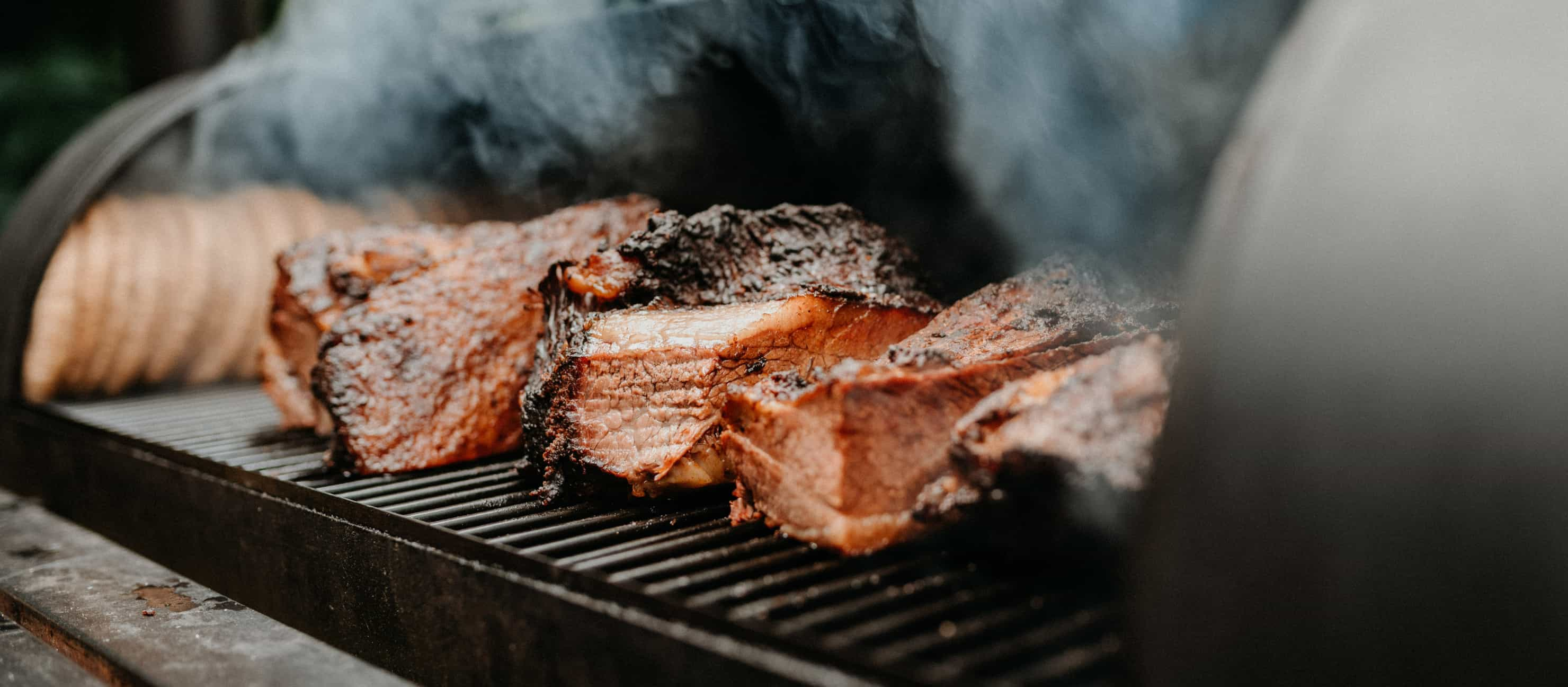
Low and slow is the ideal way to cook a delicious rack of ribs. Smokers are perfect for creating tender, flavorful, fall-off-the-bone meats. Smokers can handle a lot more than ribs, too. Smoke briskets, pork loins, and even fish!
If your mouth is watering, then you've come to the right place. We put together this complete guide so you can learn about the different types of smokers and which one is right for you.
Key Takeaways
- Complete Types of Smokers Breakdown: With so many smokers available, it's easy to feel overwhelmed when choosing one. We provide a simple breakdown of the pros, cons, recommended uses, and who each smoker is best for.
- Different Types of Smokers Deep Dive: Learn the ins and outs of charcoal smokers, kamado smokers, pellet smokers, wood smokers, offset smokers, electric smokers, natural gas smokers, and propane smokers!
- How Do Smokers Work? The smoking process can take several hours and results in a unique smoky flavor that can't be replicated with other cooking methods. Although the way that smokers work can vary, their ultimate goal is to produce delicious and tender food.
- What Type of Smoker Is Best? Electric and charcoal smokers are great for beginners. However, you should consider your budget and experience level when choosing a smoker.
Which Type of Smoker Should You Buy?
Whether you're a beginner or a pitmaster, our smoker types breakdown can help you find the perfect one for your next event or outdoor activity.
| Smoker Type | Pros | Considerations | Use It For | Who It's For |
| Charcoal Smokers |
|
|
|
Beginners to pitmasters |
| Kamado Smokers |
|
|
|
Intermediate to advanced pitmasters |
| Pellet Smokers |
|
|
|
Beginner to experienced grillers |
| Wood Smokers |
|
|
|
Intermediate to pitmasters |
| Offset Smokers |
|
|
|
Beginners to pitmasters |
| Electric Smokers |
|
|
|
Beginners to pitmasters |
| Propane Smokers |
|
|
|
Beginners to pitmasters |
What Are the Different Types of Smokers?
If you're looking for a smoker, the first thing you should decide is what type of smoker you want. A smoker can be classified based on the type of fuel they use.
Charcoal Smokers
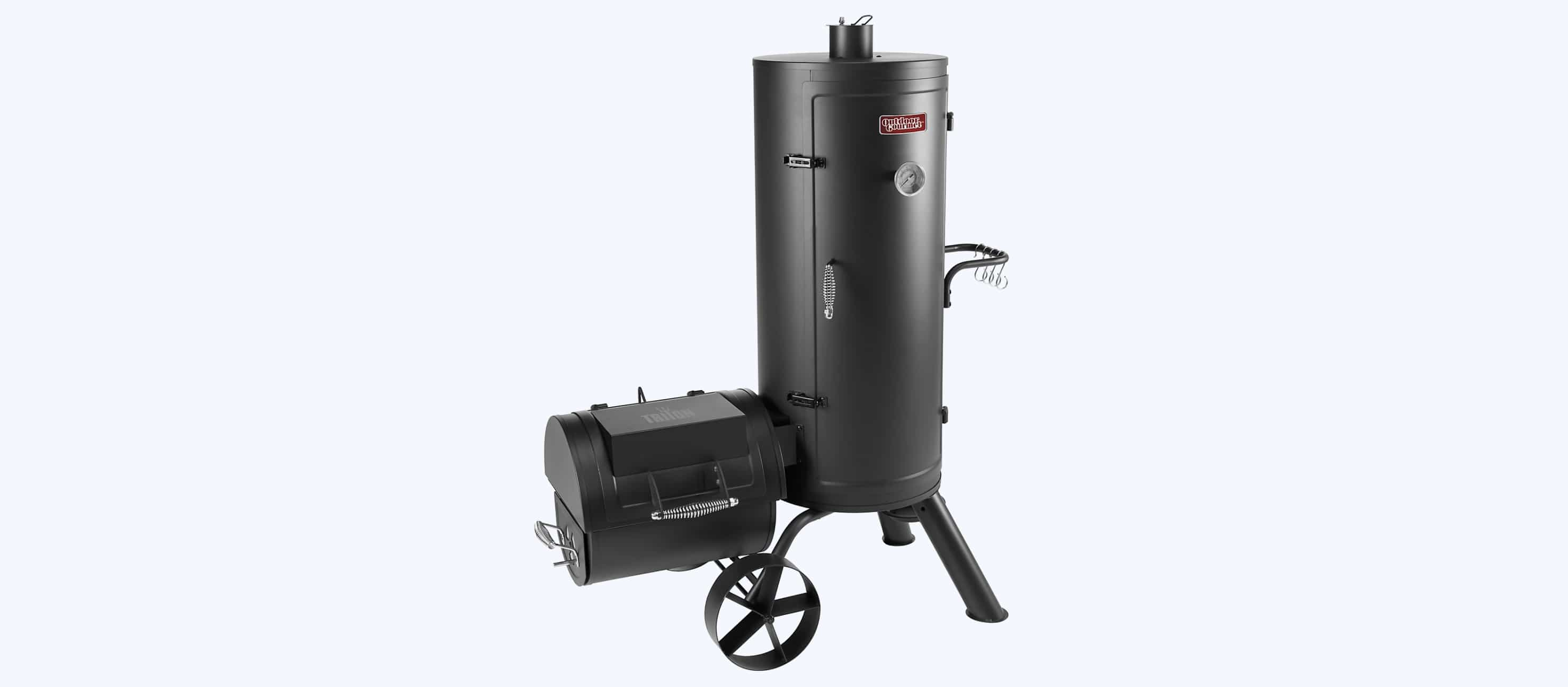
Charcoal smokers don't have a huge learning curve, so they're great for beginners. Once you've finished cooking your ribs or turkey, you will need to clean any ash, which can be time-consuming.
- They offer that classic, fall-off-the-bone meat, and smoky taste and use charcoal to slowly heat your meat.
- You can also add flavored wood to the charcoal for a more distinct, smoky flavor.
- Simply use lighter fluid to light your charcoal.
- Compared to wood, charcoal burns longer, so you don't need to check on your smoker as much.
Charcoal Smoker Pros
- Authentic flavor: Charcoal smokers can provide a more authentic smoky flavor than other types of smokers, due to the natural wood charcoal used for fuel.
- Low maintenance: Charcoal smokers have fewer moving parts than other types of smokers, making them generally low maintenance and easy to clean.
- Versatility: Charcoal smokers can be used for both smoking and grilling, giving you more cooking options in one unit.
Charcoal Smoker Cons
- Longer heating time: Charcoal smokers can take longer to heat up than propane or electric smokers, requiring more preparation time.
- Temperature control: Charcoal smokers can be more difficult to maintain a consistent temperature due to the nature of the fuel source and the lack of precise temperature control mechanisms.
- Messy: Charcoal smokers can be messier than other types of smokers, as the ash and charcoal remnants need to be cleaned out regularly to prevent buildup and potential fire hazards.
Kamado Smokers
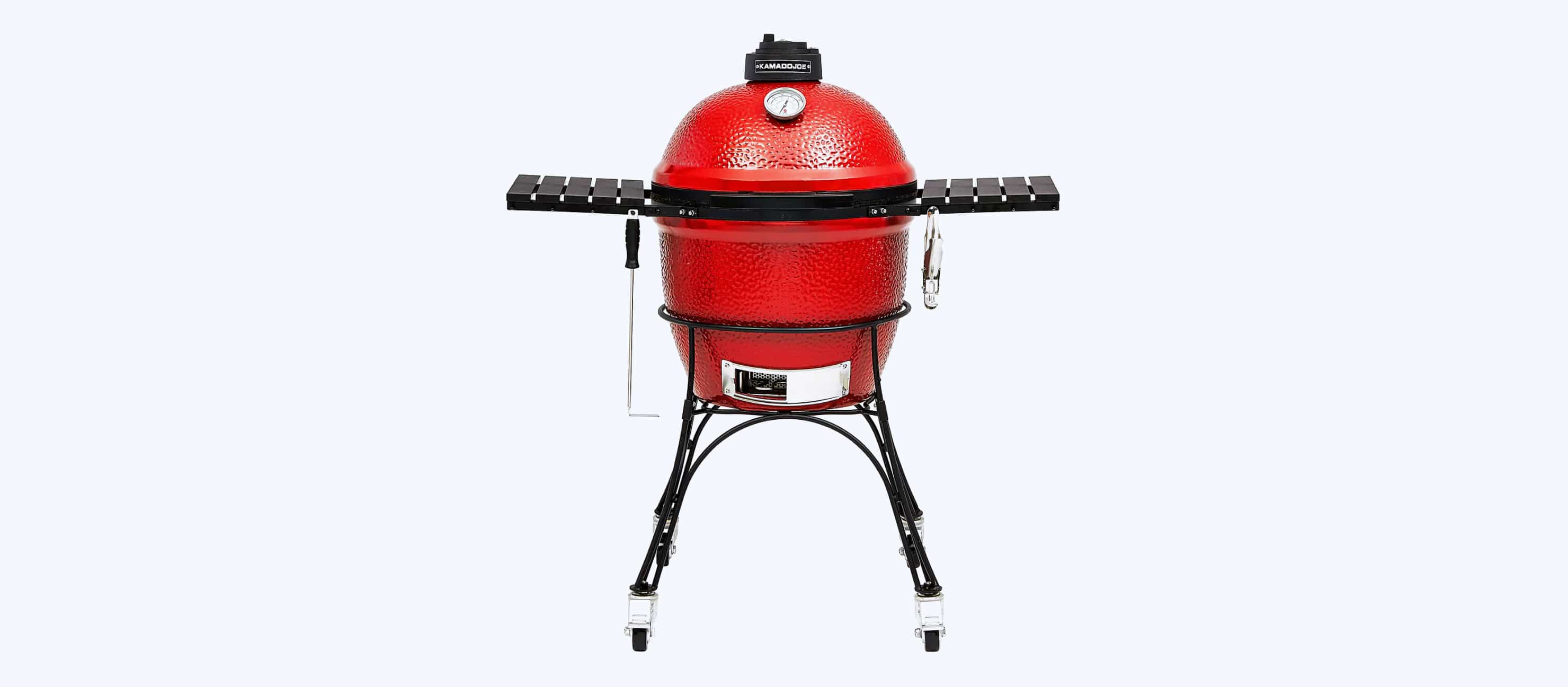
Kamado smokers are a type of charcoal smoker. They are smaller and more portable than the average smoker, which is great if you don't have a ton of room on your property.
- Kamado smokers are egg-shaped in appearance and made out of thick, durable ceramic.
- They are easy to use and require less charcoal than charcoal smokers.
Kamado Smoker Pros
- Efficient fuel usage: Kamado smokers are very efficient with their fuel usage, requiring less charcoal to achieve and maintain a desired temperature.
- High heat retention: Kamado smokers have excellent heat retention, making them ideal for longer smoking times or for cooking other foods at high temperatures.
- Versatility: Kamado smokers can be used for smoking, grilling, and even baking, making them a versatile option for outdoor cooking.
Kamado Smoker Cons
- More expensive: Kamado smokers can be more expensive than other types of smokers, especially if you opt for higher-end models or accessories.
- Heavy construction: Kamado smokers can be very heavy due to their ceramic construction, making them less portable and harder to move around.
- Learning curve: Kamado smokers require a bit of a learning curve to get used to their unique cooking style and temperature control mechanisms, which may be more difficult for beginners.
Pellet Smokers
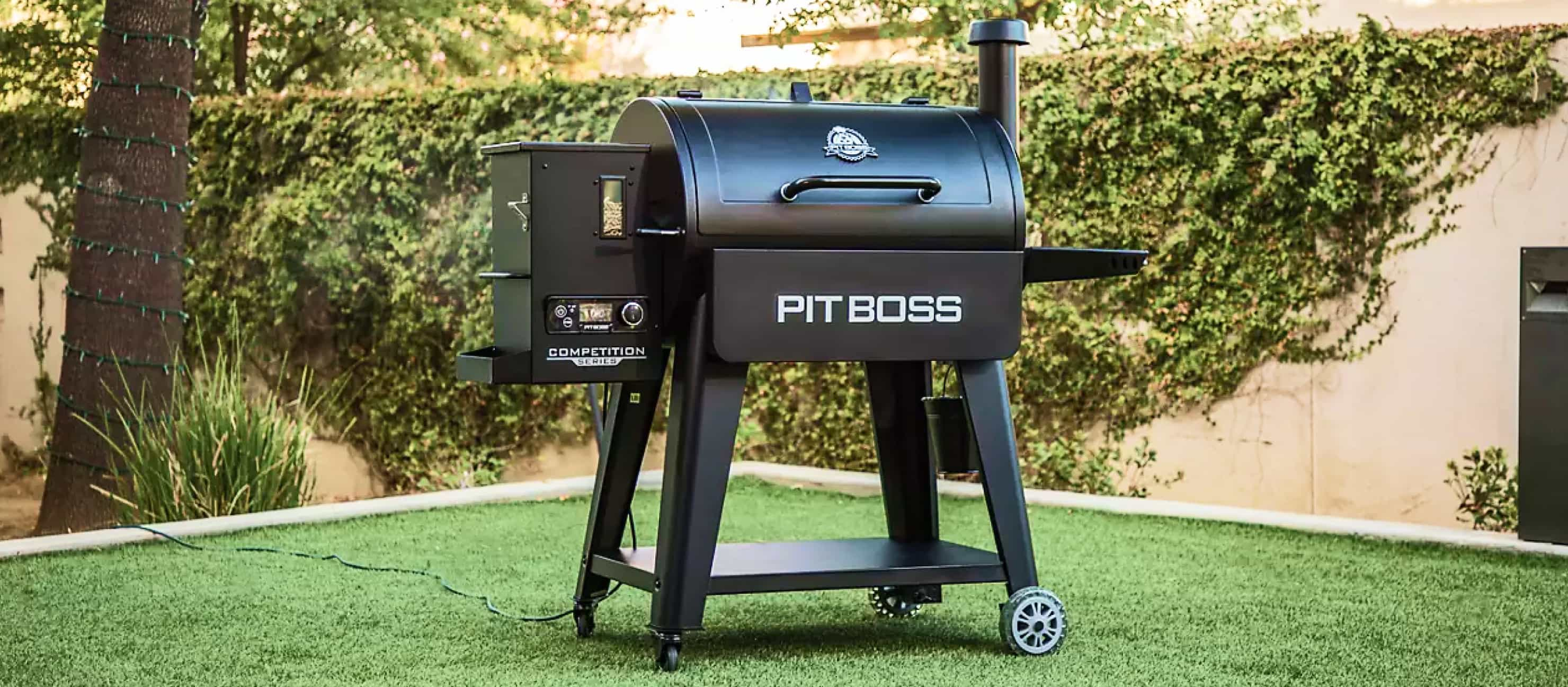
Pellet smokers are relatively easy to use, since they require little monitoring. They typically contain multiple racks so you have plenty of space for large cookouts.
- They use wood pellets that are placed in a hopper on the side of the smoker.
- An electric spark ignites the pellets, and a temperature gauge gives you an accurate reading so you can smoke for hours.
- Flavored pellets are available to help give your ribs, chicken, and turkey a smoky taste.
Pellet Smoker Pros
- Consistent temperature: Pellet smokers have a very precise temperature control mechanism, which maintains a consistent temperature throughout the cooking process, making them great for low-and-slow smoking.
- Easy to use: Pellet smokers are generally very user-friendly, with simple controls and an easy-to-load pellet hopper.
- Versatility: Pellet smokers can be used for smoking, grilling, and even roasting, giving you more cooking options in one unit.
Pellet Smoker Cons
- Expensive: Pellet smokers can be more expensive than other types of smokers, especially if you opt for higher-end models or accessories.
- Mechanical complexity: Pellet smokers have more moving parts and electronic components than other types of smokers, making them potentially more complex and difficult to repair if something goes wrong.
- Potentially less flavor: Some purists argue that pellet smokers don't provide the same authentic smoky flavor as other types of smokers, although this is a matter of personal preference.
Wood Smokers
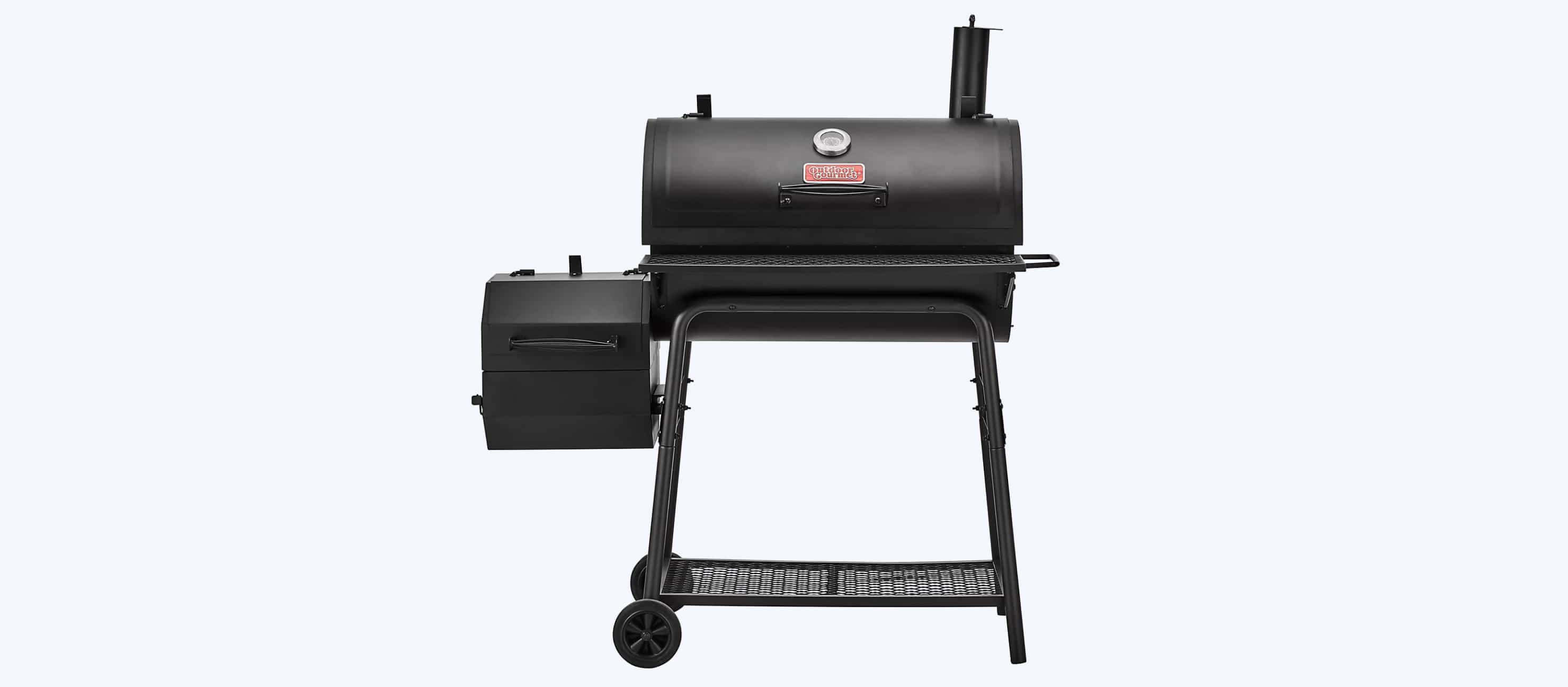
Wood smokers are similar to charcoal smokers, as you can use charcoal to maintain a high heat in your smoker. Many wood smokers also contain a firebox, which is found on the side of the smoker and helps to control temperature.
- Using a wood smoker can be an excellent way to produce savory meats with a smoky flavor and crispy skin.
- You can also use different types of wood like hickory or mesquite to create bold, smoky flavors.
Wood Smoker Pros
- Authentic flavor: Wood smokers provide an authentic smoky flavor to your food, with a wide range of wood types available to customize the flavor profile.
- Customizable: With a wood smoker, you have complete control over the smoking process, allowing you to customize the temperature, smoke level, and duration to your desired outcome.
- Lower cost: Wood smokers can be relatively inexpensive to operate, as wood can be sourced for free or at a low cost, depending on your location.
Wood Smoker Cons
- Learning curve: Wood smokers can be more difficult to use than other types of smokers, requiring a bit of practice to get the hang of temperature control and smoke level.
- Time-consuming: Wood smokers can be time-consuming, as they require more preparation and attention during the smoking process to ensure consistent temperature and smoke levels.
- Smoke production: Wood smokers can produce a lot of smoke, which can be a problem if you live in a densely populated area or if you have neighbors who are sensitive to smoke.
Offset Smokers
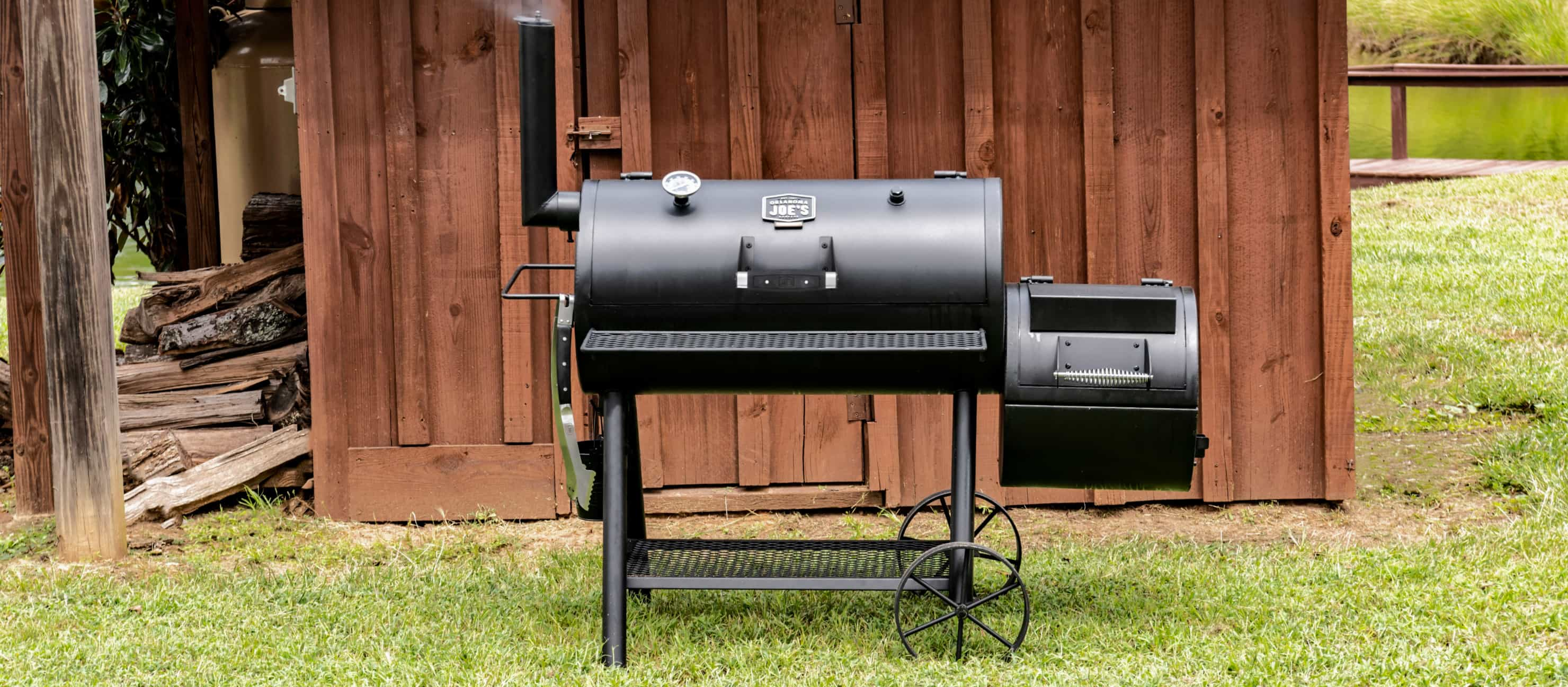
Offset smokers (also called stick burners) use wood as their only source of fuel. Their firebox is on the side of the cooking chamber with the chimney (or smokestack) on the opposite end.
- In contrast to charcoal, electric, and other wood smokers, offset smokers require you to control the temperature by adjusting the air intake or by adding more fuel.
- They don't have temperature gauges which may make them more difficult to use compared to other smokers.
- They take roughly an hour to heat up and the temperature may be more uneven throughout the chamber.
- If you want to smoke the old-school way (relying on wood alone) then you may want to opt for an offset smoker.
Offset Smoker Pros
- Customizable Flavor Profile: Offset smokers provide an authentic smoky flavor to your food, with a wide range of wood types available to customize the flavor profile.
- Large capacity: Offset smokers typically have a large capacity, allowing you to smoke a lot of meat at once.
- Lower cost: Offset smokers can be relatively inexpensive to operate, as wood can be sourced for free or at a low cost, depending on your location.
Offset Smoker Cons
- Learning curve: Offset smokers can be difficult to master, as they require skill and practice to properly control the temperature and smoke levels.
- Smoke production: Offset smokers can produce a lot of smoke, which can be a problem if you live in a densely populated area or if you have neighbors who are sensitive to smoke.
- Maintenance: Offset smokers require regular maintenance, including cleaning out the firebox and ash removal, to keep them running efficiently and safely.
Electric Smokers
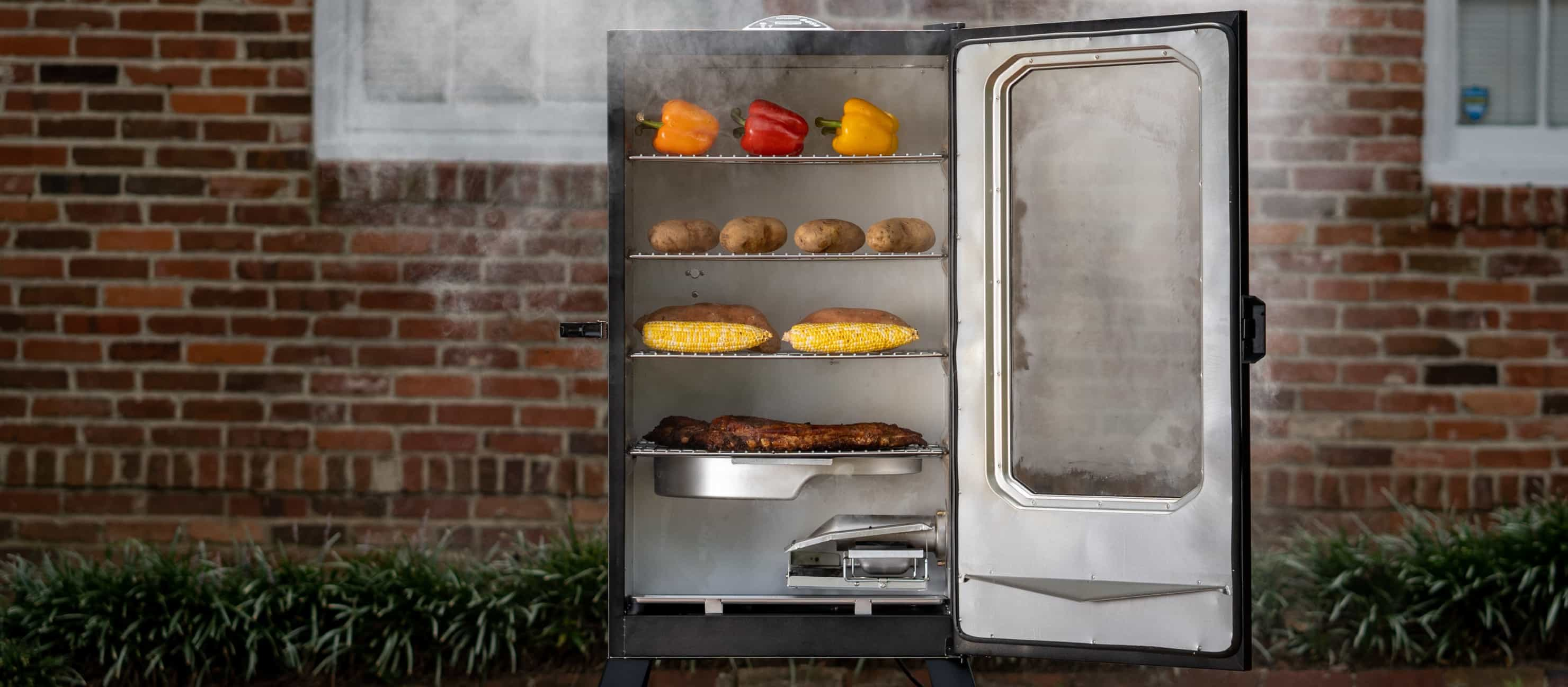
Electric smokers require electricity to heat up. They don't rely on any fuel and are energy efficient. Choose an electric smoker if you live in a remote area or if you're going camping where you can't have an open fire.
- Electric smokers are optimal for smoking delicate fish or cheese.
- They are smaller in size and may not be able to hold a ton of food.
- Add wood chips to your smoker to infuse your food with a smoky flavor.
Electric Smoker Pros
- Convenience: Electric smokers are very convenient to use, with a push-button ignition and automatic temperature control that allows you to set it and forget it.
- Consistency: Electric smokers are very consistent in their cooking, maintaining a constant temperature throughout the smoking process.
- Low smoke production: Electric smokers produce less smoke than other types of smokers, making them ideal for use in urban areas or in locations with strict smoking regulations
Electric Smoker Cons
- Limited flavor options: Electric smokers may not provide the same level of smoky flavor as other types of smokers, and the flavor options may be limited to only a few types of wood chips or pellets.
- Limited temperature range: Electric smokers may not be able to reach the high temperatures that other types of smokers can achieve, limiting your cooking options.
- Dependence on electricity: Electric smokers require a power source, making them less portable and potentially unusable in locations without access to electricity.
Propane/Gas Smokers
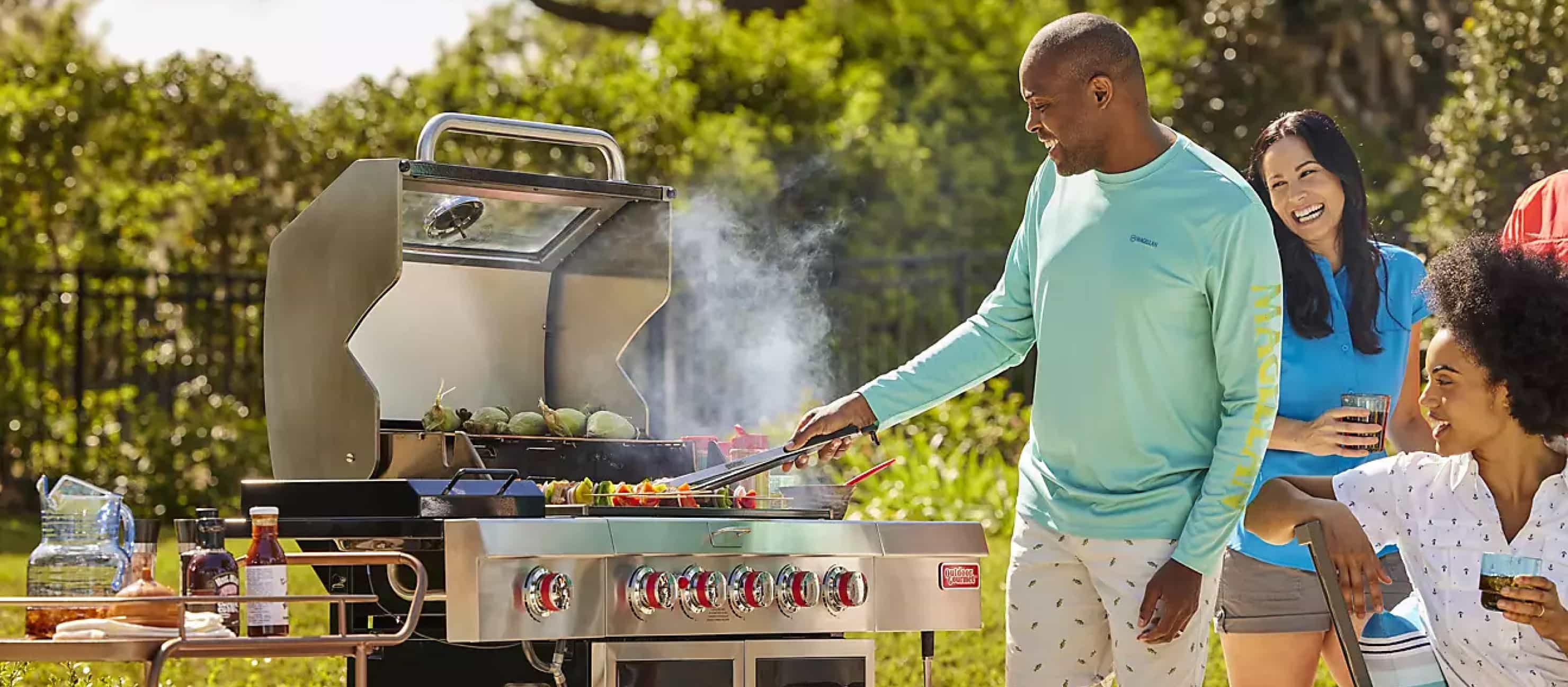
Propane smokers use propane and convection to heat food. Sometimes referred to as vertical propane smokers, these smokers are generally portable and easy to use.
- It takes anywhere from 10-15 minutes for them to heat up, and the temperature can be adjusted easily.
- Keep extra propane tanks on hand so you don't run out of fuel.
Propane Smoker Pros
- Portable and versatile: Propane smokers are often designed to be lightweight and compact, making them easy to transport and store. They are also versatile in terms of cooking options, with many models allowing you to grill, smoke, roast, and bake.
- Fast cooking: Propane smokers heat up quickly and can reach high temperatures, making them ideal for quick cooking, such as searing meats and cooking pizzas.
- Easy to start: Propane smokers are incredibly easy to start as all you need to do is turn on the propane and ignite the burner, making them ideal for those who are new to smoking.
Propane Smoker Cons
- Cost of propane: Propane can be expensive, especially if you use your propane smoker frequently. This cost can add up over time and make propane smokers less cost-effective than other types of smokers.
- Limited smoke flavor: While propane smokers do provide some level of smoke flavor, it may not be as rich and robust as other types of smokers, which can be a drawback for those who want a more traditional smoky taste.
- Storage: Propane tank storage requires proper ventilation and protection from the elements to prevent damage to tanks and potential leaks.
How Do Smokers Work?
Smokers work by cooking food slowly at low temperatures using smoke generated from burning wood, charcoal, pellets, or gas. The heat and smoke are usually generated in a separate chamber and transferred to the cooking chamber, where the food is placed.
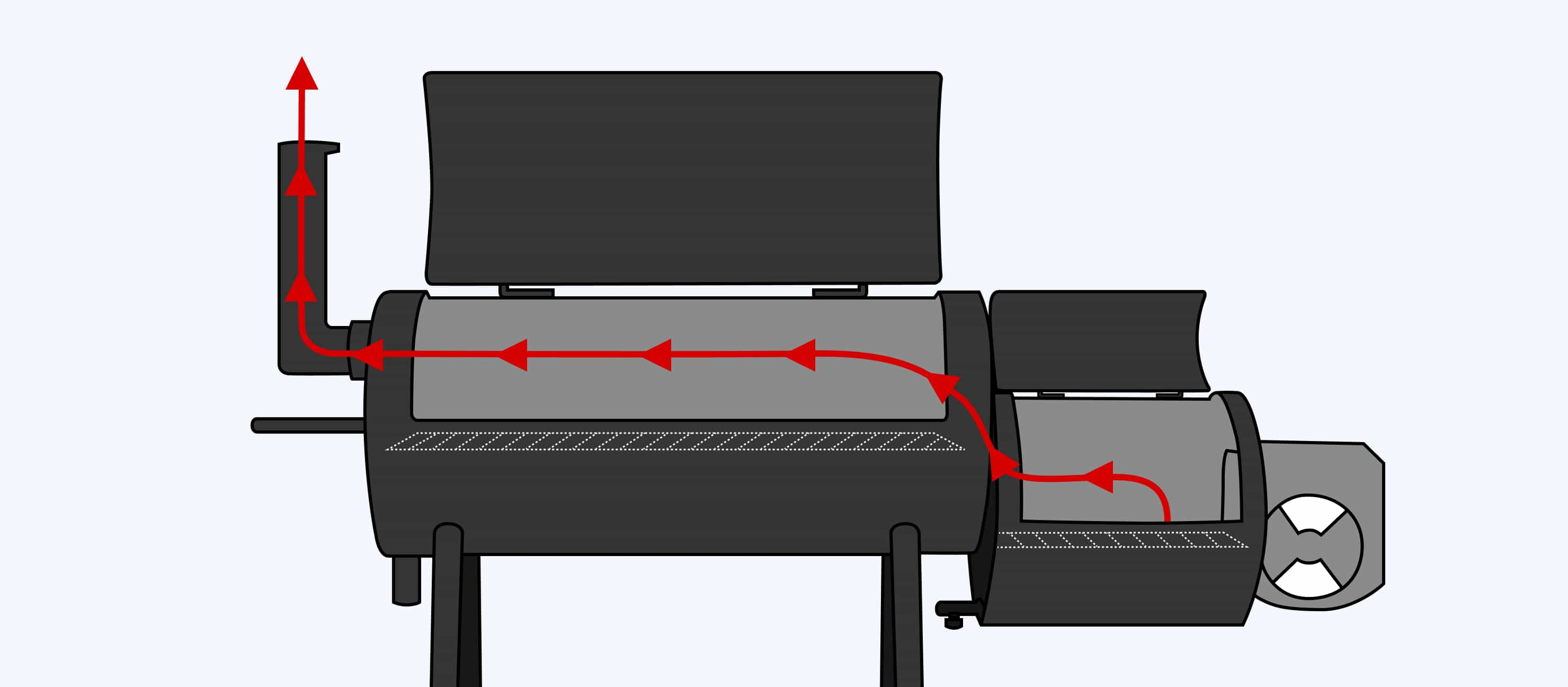
What Type of Smoker Is Best?
- If You're a Beginner: If you're new to smoking, opt for a charcoal or pellet smoker. Most smokers, aside from offset smokers, are relatively easy to use.
- If You Want to Smoke Like a Professional: A lot of pitmasters use wood or offset smokers for the ease of flavor profile customization. However, all smokers can produce savory meats so don't feel boxed into any one type.
- If You Don't Have Access to Electricity: If you'll be smoking off the grid, you'll want to avoid pellet or electric smokers, which both require electricity. Choose wood or charcoal smokers instead.
Have Fun Out There!
Ready to break out the smoker and create a BBQ feast? Check out our smokers and get cooking! We have everything you need to make that mouthwatering recipe for your family, friends, and neighbors.


